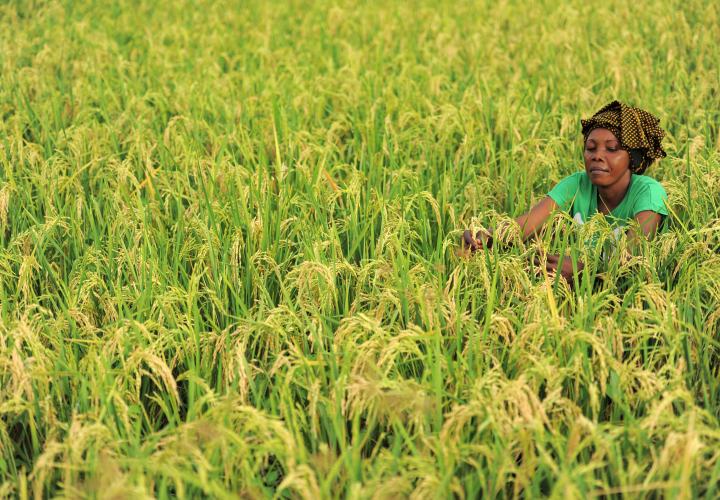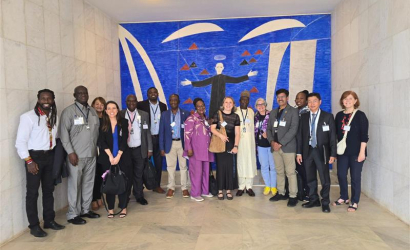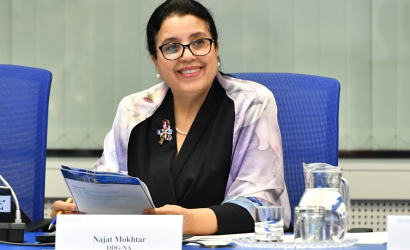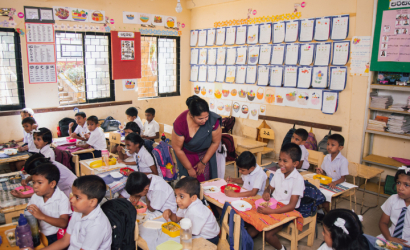The 2022 State of Food Security and Nutrition in the World (SOFI) report states that world hunger, food insecurity and malnutrition are still on the rise, and almost 3.1 billion people were not able to afford a healthy diet in 2020. At the same time, the triple planetary crisis of climate change, biodiversity loss and pollution is worsening, challenging both human and planetary health. Diets and food systems are at the heart of the nutrition-environment nexus; the food we eat, how it is produced and its journey from farm to plate determine how food systems affect human and planetary health.
Population growth, urbanization, economic growth and the unequal distribution of power in food systems are fueling a transition to diets high in refined carbohydrates, saturated fat, salt and ultra-processed foods. In addition to having low nutritional quality, such diets tend to have a high environmental footprint, exacerbating both environmental and nutritional challenges.
Furthermore, conflicts, extreme weather events, infectious diseases, and competition over access to resources like water and arable land, are contributing to the deteriorating health and nutrition status of the world population, with the most vulnerable disproportionately affected.
UN-Nutrition, the inter-agency coordination mechanism for nutrition, upholds a vision of a world without malnutrition, where everyone everywhere enjoys the right to adequate food, interdependent on and indivisible from all human rights now and in future. Contributing to its achievement, UN-Nutrition has been building a common understanding of the links between nutritional and environmental challenges and how to address them to support international, national, and sub-national policymakers in building sustainable and resilient food systems that benefit both people and the planet.
Inclusive governance to transform food systems
In January 2023, UN-Nutrition in partnership with the Committee on World Food Security (CFS), organized a high level panel discussion focused on the urgent need for food system transformation at the 2023 Global Forum for Food and Agriculture in Berlin. The event brought into focus the importance of coherent policies and efficient actions to address the current global food crisis and build sustainable and resilient food systems. Inclusive governance to promote collaboration and synergetic action among relevant actors in the food system and support evidence-based policy coherence between all relevant stakeholders was a key theme of the discussion. Effective coordination between governments, UN entities, civil society organizations and the private sector was highlighted as essential to increase harmonization and ensure aligned action in countries, also building on the experiences of both the CFS and UN-Nutrition.
Three ministers – the Chilean Minister of Agriculture Mr Esteban Valenzuela Van Treek, the United Arab Emirates Minister of Climate Change and Environment Ms Mariam Al Mehairi and the Minister of Agriculture and Rural Development of Côte d’Ivoire Mr Kobenan Adjoumani – reiterated the importance of collaboration among different actors of the food system. They also highlighted the importance of innovation and research, as well as social protection measures, to stimulate local production, ensure access to more diversified and nutritious diets, make better use of local varieties, and the need to strengthen the resilience and sustainability of food systems to limit the negative impacts of the current crisis, and prevent future ones.
The message from the event was summed up perfectly by WHO’s Dr Maria Neira, who said:
We have one mission as UN, as governments and as a society, which is to make sure that we nourish our people while we do not destroy the planet. This seems like a simple mission but at the moment we are not able to deliver on that.

Nutrition, food systems and climate change at the table of policy makers
The 27th UN Climate Change Conference of the Parties in Egypt in November 2022, provided a unique opportunity to carry forward the message of how evidence-based policies and programmes can provide co-benefits for nutrition and the environment, being the first to feature agriculture in its agenda.
UN-Nutrition promoted nutrition as an integral part of the climate agenda and increased awareness about the interlinkages between diets, food systems and climate change through several events. A flagship UN-Nutrition discussion paper on environmental and nutrition interlinkages and the triple planetary crisis was pre-launched during an official side event titled ‘Ensuring healthy diets for all in face of a Warming Planet: Challenges, Opportunities, and Solutions’.
Outcomes of COP 27 included a number of initiatives supported by UN-Nutrition member agencies.
- the launch by Egypt as COP27 Presidency, in partnership with WHO, FAO, other UN agencies and partners such as GAIN, of the Initiative on Climate Action and Nutrition (I-CAN), a multistakeholder, multisectoral global flagship initiative that aims at fostering collaboration to accelerate transformative action to address the critical nexus of climate change and nutrition.
I-CAN recognizes that climate change and malnutrition are two of the greatest interlinked challenges to humanity today and proposes four pillars of action. The initiative received strong support from many countries, including the UK, Canada, Cote d'Ivoire as well as The United Arab Emirates, hosts of COP28 in 2023, who looked forward to progress of I-CAN being reported on.
- The Food and Agriculture for Sustainable transformation (FAST) Initiative will support climate action in agrifood systems through three pillars: 1) access to finance and investment; 2) knowledge and capacity development; and 3) policy support and dialogue and will be facilitated by FAO in collaboration with other UN agencies. Several Ministers, including France, New Zealand, Germany, UK, Brazil and Japan, supported the initiative.
A month after COP27, UN-Nutrition Members, in particular UNEP, FAO and IFAD were further able to engage and make use of the jointly crafted key messages on nutrition and the environment to deliver strong and coherent statements on nutrition at the second part of the UN Conference of the Parties to the Convention on Biological Diversity (COP15 CBD) which took place in Montreal, Canada. Here policy makers agreed on a new set of goals to guide global action through 2030 to halt and reverse nature loss.
The way forward for UN-Nutrition
With only seven years remaining to achieve the Sustainable Development Goals, it is imperative that the topic of healthy diets from sustainable food systems is at the heart of the global agenda and part of conversations taking place at global, regional, national, and sub-national levels.
A food systems approach for improved human and planetary health is at the core of UN-Nutrition’s work. UN-Nutrition members UNICEF and WFP are leading the efforts to build a narrative on food systems transformation in crises and fragile contexts, while FAO and WHO are guiding the work on healthy diets from sustainable food systems, including by ensuring synergies with the Coalition of Action on Healthy Diets from Sustainable Food Systems for Children and All (HDSFS) and other relevant initiatives such as the I-CAN, and the preparations for COP28. The UN-Nutrition Secretariat is supporting members’ actions across different initiatives and with strategic partners. This includes the UN Food Systems Coordination Hub to mobilize UN Food Systems Summit Coalitions to transform food systems with sustainable healthy diets as one of the major outcomes. A session on this topic has been organized at the 4th global conference of the One Planet Network’s Sustainable Food Systems Programme (SFSP) on Wednesday 26th of April, and the results will feed into the 2023 UN Food Systems Stocktaking Moment in July 2023.
As part of the Advisory group of the Committee on World Food Security (CFS), UN-Nutrition is advocating for having a food systems approach for improved human and planetary health at the core of the new multi-year programme of work of the Committee, to be approved by the CFS Plenary in October 2023.



